The Labor Intensive Sector Has the Most Potential to Increase Business Income in Bali
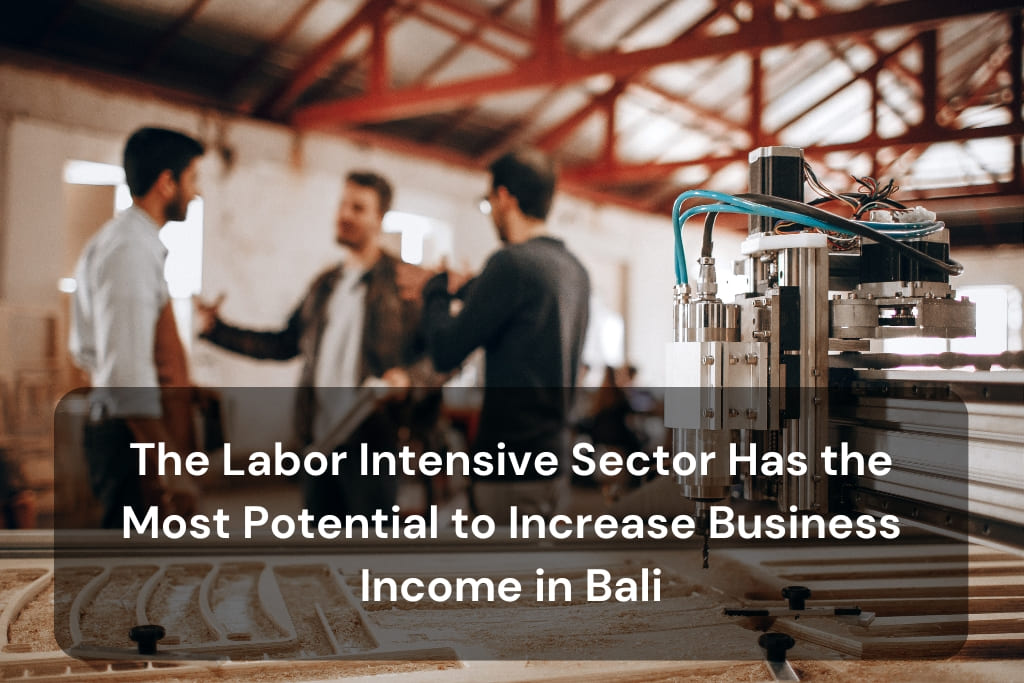
Bali’s economy has long been driven by its vibrant tourism industry, but as the island seeks to diversify its economic base, labor intensive sectors are emerging as key drivers of growth. With strategic support from government initiatives and a focus on inclusive development, industries such as tourism, agriculture, and small-scale manufacturing hold immense potential to boost business income in Bali. This article explores why labor intensive sectors are crucial for Bali’s economic progress and how they can maximize profitability. A. Labor Intensive Sector in Bali The following are several labor intensive sectors that have an important role in improving the economy in Bali. Tourism remains the most prominent labor intensive sector in Bali, employing thousands of workers across hotels, restaurants, and transportation services. According to Bank Indonesia’s Balinomics 2025 strategy, tourism based on culture and local wisdom is a cornerstone of the island’s development. By promoting equitable tourism through initiatives like tourism villages and digitizing the sector, Bali aims to enhance the quality of visitor experiences while creating more job opportunities. The continued focus on cultural tourism—such as traditional dance performances, temple tours, and local crafts—ensures that the sector remains labor intensive. This approach not only boosts employment but also supports micro, small, and medium enterprises (MSMEs) that cater to tourists. For businesses in this sector, investing in staff training and adopting digital tools can significantly improve efficiency and profitability. Agriculture is another labor intensive sector that plays a vital role in Bali’s economy. Employing approximately 480,000 workers as of 2024, the sector includes farming, forestry, and fishing activities. Despite its importance, agriculture has often been overshadowed by tourism. However, recent government efforts to increase agricultural productivity and strengthen MSME institutions in this field are unlocking new opportunities. For instance, downstreaming agricultural products—such as turning raw produce into packaged goods or organic products—can add significant value to the sector. Businesses involved in agriculture can benefit from these initiatives by exploring export markets or collaborating with local cooperatives to scale production. Bali’s creative industries are deeply rooted in its culture and traditions. Small-scale manufacturing of goods like textiles, jewelry, and handicrafts provides employment for thousands of artisans across the island. These industries are labor intensive by nature and have strong export potential when marketed effectively. To maximize income from this sector, businesses can focus on branding their products as premium or eco-friendly items for international markets. Additionally, fostering partnerships with e-commerce platforms can help artisans reach a broader audience while maintaining sustainable production practices. B. Government Support for Labor Intensive Sectors The Indonesian government has recognized the importance of labor intensive sectors in driving inclusive growth. Through policies like Macroprudential Liquidity (KLM) incentives for banks that finance priority sectors—including MSMEs—businesses in Bali can access affordable credit to expand operations. Moreover, initiatives to control inflation and improve food security further support these sectors by stabilizing costs and ensuring steady supply chains. Bank Indonesia’s strategy also emphasizes reducing regional disparities by encouraging investments outside South Bali. This approach ensures that labor intensive industries contribute to balanced economic development across the island. C. Challenges Facing Labor Intensive Sectors While labor intensive sectors hold significant potential for increasing business income in Bali, they also face challenges such as competition from capital-intensive industries and reliance on manual labor. For example, sectors like information technology and manufacturing automation are growing rapidly but require fewer workers compared to traditional industries. Additionally, global competition from countries like Vietnam and Bangladesh—known for their lower labor costs—poses a threat to Bali’s ability to attract investment in labor intensive industries. To address these challenges, businesses must focus on improving worker productivity through training programs and adopting modern technologies where feasible. D. Strategies for Businesses to Maximize Profitability To fully leverage the potential of labor intensive sectors in Bali, businesses should adopt the following strategies: Conclusion labor intensive sectors such as tourism, agriculture, and small-scale manufacturing are pivotal for boosting business income in Bali. With targeted government support and strategic investments by businesses, these industries can drive inclusive growth while creating employment opportunities for thousands of Balinese workers. By addressing challenges through innovation and collaboration, Bali can unlock the full potential of its labor intensive sectors and build a more resilient economy for the future.
Bali as a Fashion Business Innovation Center: Inspiration from BFN 2025

Bali, known for its breathtaking landscapes and rich cultural heritage, is increasingly emerging as a hub for fashion innovation. The upcoming Bali Fashion Network (BFN) 2025 event, scheduled for November 2, 2025, is set to further solidify this status by providing a platform for designers, entrepreneurs, and industry professionals to connect, collaborate, and showcase their talents. This article explores how BFN 2025 is poised to position Bali as a center for fashion business innovation. The Rise of Bali as a Fashion Destination Over the past few years, Bali has transformed from a mere tourist destination into a vibrant center for creative industries, particularly fashion. The island’s unique blend of traditional craftsmanship and contemporary design has attracted both local and international designers. Events like the Bali Fashion Network play a crucial role in this transformation by fostering an ecosystem that supports innovation and collaboration among various stakeholders in the fashion industry. Highlights of Bali Fashion Network (BFN) 2025 BFN 2025 promises to be an exciting event that showcases the latest trends and innovations in fashion. Here are some key highlights: Goals of Bali Fashion Network (BFN) 2025 The Bali Fashion Network (BFN) 2025 aims to strengthen Bali’s position as a center for fashion innovation by creating a collaborative platform for designers, entrepreneurs, and industry players. This event is designed to: With this strategic vision, BFN 2025 is expected to not only strengthen the fashion ecosystem in Bali but also create a positive impact on local communities and the environment. BFN Impact on Local Communities The growth of the fashion industry in Bali has significant implications for local communities. By supporting local designers and artisans, BFN helps create job opportunities and stimulates economic growth in the region. This not only benefits individual entrepreneurs but also contributes to the overall development of Bali as a creative hub. Conclusion As Bali continues to evolve into a center for fashion business innovation, events like BFN 2025 play a pivotal role in shaping its future. By fostering collaboration among diverse stakeholders, promoting sustainability, and showcasing local talent, Bali is well-positioned to become a leading player in the global fashion industry. The anticipation surrounding BFN 2025 reflects Bali’s growing importance as a destination for creativity and innovation in fashion. As designers and entrepreneurs come together to share their visions and insights, they contribute not only to their own success but also to the broader narrative of Bali as a vibrant hub for fashion business innovation. With continued support from various stakeholders, including government bodies and private enterprises, Bali’s potential as a fashion capital is limitless.
Tourism Equity in Bali: GIPI’s Efforts to Spread Visits to the Northern and Eastern Regions
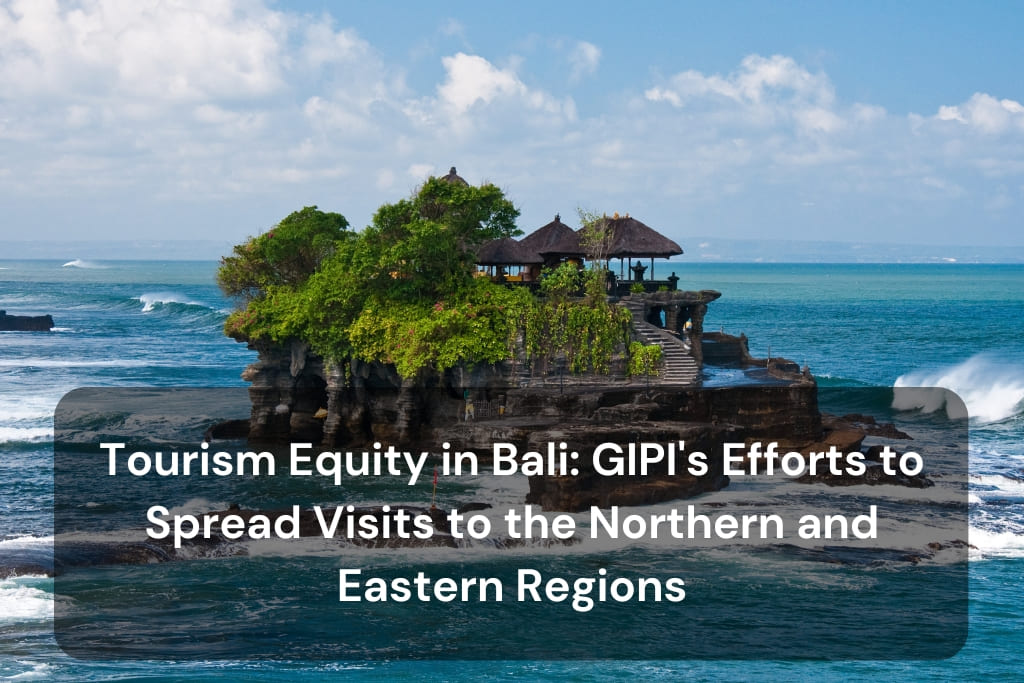
Bali, known for its stunning landscapes and vibrant culture, has long been a favorite destination for tourists from around the world. However, the concentration of tourism activities in the southern part of the island has raised concerns about sustainability and equitable distribution of economic benefits. The Indonesian Travel Agents Association (GIPI) is at the forefront of efforts to promote tourism equity by encouraging visitors to explore the northern and eastern regions of Bali. The Challenge of Over-Concentration The southern region of Bali, particularly areas like Kuta, Seminyak, and Nusa Dua, has become synonymous with tourism. These areas boast a plethora of accommodations, restaurants, and attractions, making them easily accessible and appealing to tourists. However, this over-concentration has led to several challenges: GIPI’s Strategic Initiatives To address these challenges, GIPI is implementing several strategic initiatives aimed at redistributing tourist visits across the island. These initiatives focus on promoting the unique offerings of northern and eastern Bali while ensuring that local communities benefit from tourism. The efforts led by GIPI are expected to yield several positive outcomes, such as: Conclusion As Bali continues to attract millions of visitors yearly—6.5 million international arrivals are targeted for 2025, equitable tourism distribution becomes increasingly important. GIPI’s initiatives represent a proactive approach to addressing the challenges posed by concentrated tourism in southern Bali. By promoting the northern and eastern regions as viable alternatives for travelers, GIPI aims not only to enhance economic opportunities for local communities but also to ensure a more sustainable future for Bali’s tourism industry. Through collaboration with various stakeholders—including government bodies, local communities, and businesses—GIPI is paving the way for a more equitable distribution of tourism benefits across the island. As these efforts unfold, they hold the promise of transforming Bali into a destination where all regions thrive together while preserving the unique cultural heritage that makes it so special.
Transportation Innovations in Bali: from Electric Rickshaws to Battery Trams

Bali, the enchanting “Island of Gods,” continues to strive to balance tourism growth with environmental sustainability. A key to achieving this balance is investing in sustainable transportation innovations. In addition to infrastructure initiatives, Bali is also embracing various innovative vehicle types that promise more efficient and environmentally friendly mobility. As we know, Bali faces significant transportation challenges such as: To address these challenges, Bali is experimenting with various innovative vehicle types, some of which are even inspired by international transportation models: Impacts and Challenges of Adopting Innovative Vehicles The adoption of these innovative vehicles has positive impacts: However, there are challenges that need to be addressed: Bali has great potential to become a showcase for sustainable transportation in Indonesia. By continuing to invest in innovation, addressing existing challenges, and involving all stakeholders, Bali can create a transportation system that is efficient, environmentally friendly, and improves the quality of life for its people. The future of Bali’s mobility is a greener and more sustainable future.
E-Visa Bali Services Streamlines Indonesian Visa Applications for Hassle-Free Bali Adventures

Bali, with its rich natural beauty and culture, has always been a magnet for international tourists. However, this attraction often means crowds and long lines, especially during the holiday season. The good news is, there is now a smart solution that can make your trip smoother and more comfortable, especially if you want to avoid the crowds, namely the E-Visa Bali. E-Visa Makes Travel Easier During Off-Peak Seasons E-Visa, or Electronic Visa, is an innovation that allows you to apply for a visa online before departure. With an E-Visa, you no longer need to queue at the immigration counter upon arrival at the airport. The process is quick, efficient, and can be done from anywhere. Here are the benefits you will receive if you use an E-visa: With an E-Visa, you can enjoy your vacation in Bali more peacefully and comfortably due to its simple and flexible process. However, even so, you must remain diligent in the application process to avoid mistakes. Here are some additional tips for using an E-Visa for a more relaxed vacation. Ready for Bali without stress and long queues? Imagine… You arrive in Bali, welcomed by the warm sun and gentle breeze. No more long queues at immigration, because the E-Visa is already in hand! Holidays should be stress-free, and that’s why the Bali E-visa is here to help. We believe that everyone deserves to enjoy the beauty of Bali without hassle. Therefore, we have made the E-Visa application process very quick and easy, taking only a few minutes. Our team of experts is ready to assist you 24/7 if you have any questions or issues. Your data security is our top priority, so don’t worry! Don’t let long queues hinder your vacation dreams. Consult now and apply for your E-Visa. I guarantee, this will be one of the best decisions for your trip to Bali. Contact the details below, and let’s make your dream vacation a reality! Contact us Whatsapp: +62 877 88 5000 99 Email: info@evisabali.com Instagram: @evisabali
Visiting Hidden Places in Bali

Visiting Hidden Places in Bali: Unveiling the Island’s Untouched Gems Bali, “The Last Paradise” on earth often conjures images of bustling beaches in Kuta, iconic rice terraces of Ubud, and majestic temples in Tanah Lot. While these destinations are undeniably captivating, Bali holds a treasure trove of lesser-known gems that offer a more intimate and authentic experience. Venturing beyond the well-trodden path allows travelers to discover the island’s hidden beauty, connect with local communities, and create unforgettable memories. This article will guide you through some of Bali’s most enchanting hidden places, offering a glimpse into the island’s untouched beauty and cultural richness. Adventure to Discover the Authentic Bali Escaping the crowds is not just about finding a quiet spot; it’s about immersing yourself in the true spirit of Bali. The island’s northern and western regions offer a stark contrast to the south, with tranquil landscapes, fewer tourists, and a palpable sense of serenity. Hidden Place in North Bali: Waterfalls, Temples, and Dolphin Encounters Hidden Places in Central Bali: Cultural Immersion and Natural Beauty Hidden Place in West Bali: Nature Reserves and Secluded Beaches Hidden Place in East Bali: Sacred Sites and Underwater Wonders From the cascading waterfalls of North Bali to the secluded beaches of West Bali, there is something for every traveler seeking a more authentic and enriching experience. One of the greatest rewards of exploring Bali’s hidden places is the opportunity to connect with local communities and learn about their way of life. Many of these areas offer homestays and guesthouses run by local families, providing a more authentic and immersive experience. Take the time to chat with your hosts, learn about their traditions, and sample their delicious home-cooked meals. As tourism continues to grow in Bali, it is essential to protect the beauty and integrity of these hidden places. Responsible travel practices, such as minimizing waste, supporting local businesses, and respecting the environment, are crucial for ensuring that future generations can enjoy these treasure.
Bali Visa Application: Cost and Processing Time Comparison
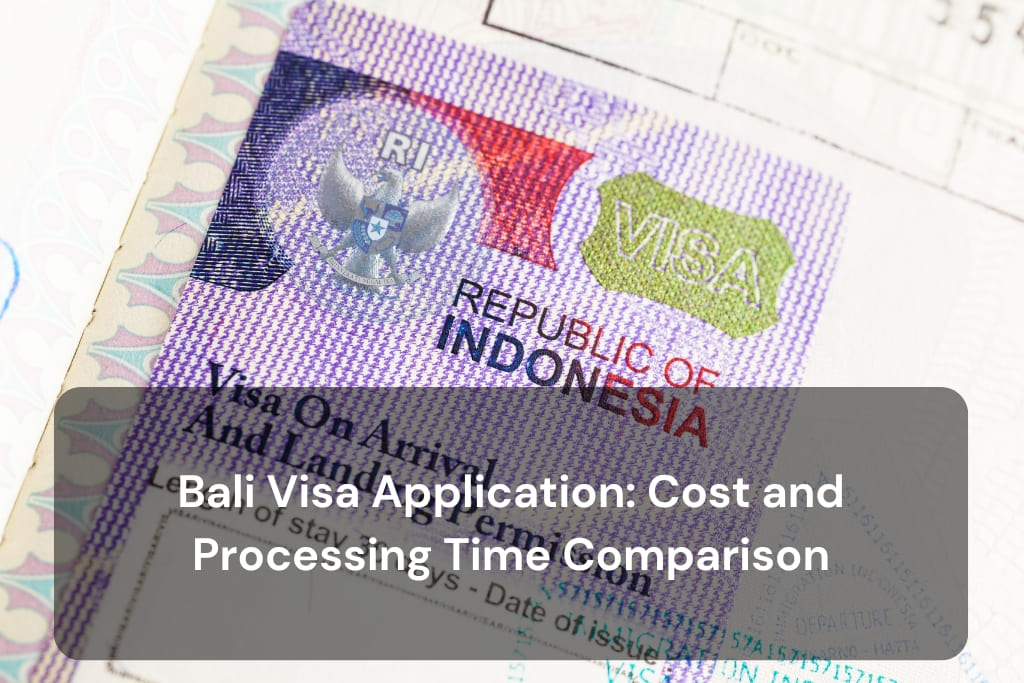
Bali, as one of the world’s most popular tourist destinations, offers a variety of visa types to meet the needs of travelers. Understanding the cost and processing time of a visa application is essential to ensure a successful visa application. This article will compare the different types of visas available, the costs associated with them, and the time required to apply. Here is a comparison of the costs for several types of visas commonly used by tourists who want to visit Bali: Visa Types Cost (IDR) Validity period Single Entry Visa (Tourism) 1.500.000 maximum 60 days Single Entry Visa (Non-Tourist) 2.000.000 maximum 60 days Multiple Entry Visit Visa 3.000.000/year maximum 1 year Longest Visit Visa (180 Days) 6.000.000 Maximum 180 days Visa On Arrival (VOA) 500.000 Maximum 30 days & can be extended for 30 days E-Visa (B211A) 750.000 maximum 60 day stay & can be extended twice for 60 days each. [Additional information]: The above prices are the official prices listed by the Indonesian government. The prices will be different if you use an agent. However, the advantage if you use an agent’s services is that the visa can be processed more quickly and avoid rejection during application. Visa application processing times vary depending on the type of visa applied for: It’s helpful to understand what influences the cost you’ll ultimately pay for your Bali visa. Several factors come into play when determining these fees, so let’s take a closer look at the key elements that affect the price tag on your permission to enter paradise. Preparing for Changes As you plan your Bali trip in 2025, it’s important to remember to factor in the potential for changes in visa fees and how these adjustments might impact your overall travel budget. Given the evolving nature of Indonesian visa policies, and with the government frequently adjusting fees to streamline immigration and boost tourism revenue, it’s wise to stay informed. To ensure a smooth and compliant application process, consider consulting with visa experts or agencies for guidance on Bali visa and stay permit requirements. Before you begin your application, make sure to stay updated by regularly checking official government sources and reputable visa service websites for the latest information on regulations and costs. Staying proactive in gathering current information will help you avoid any unexpected surprises and ensure a stress-free start to your Bali adventure.
Bali on a Budget: Budget Tips for a Holiday to Bali Especially for European Backpackers

Bali, the “Island of Enchantment,” has long been a magnet for European backpackers seeking sun-drenched beaches, vibrant culture, and spiritual rejuvenation. The allure of Bali is undeniable, but the cost of travel can quickly add up. Fortunately, with some savvy planning and budget-conscious choices, you can experience the magic of Bali without breaking the bank. This guide offers essential budget tips specifically tailored for European backpackers looking to maximize their experience while minimizing their expenses. Pre-Trip Planning: The Foundation of a Budget Bali Holiday The foundation of any successful budget trip lies in the pre-trip planning phase. This is where you can make the most significant impact on your overall spending. On-the-Ground Budget Hacks in Bali Once you arrive in Bali, you’ll need to be smart about your daily expenses. Here are some effective ways to save money while enjoying your Bali adventure: Essential Tips for European Backpackers Here are some extra tips specifically for European backpackers: Embracing the Budget Bali Experience Traveling to Bali on a budget doesn’t mean sacrificing the quality of your experience. By following these tips, you can enjoy the beauty, culture, and adventure that Bali has to offer while staying within your financial limits. Embrace the local way of life, be open to new experiences, and you’ll create unforgettable memories that will last a lifetime. With smart planning and a spirit of adventure, Bali is truly a paradise accessible to every budget-conscious European backpacker.
Latest Updates on Visa Policies for Tourists Visiting Bali
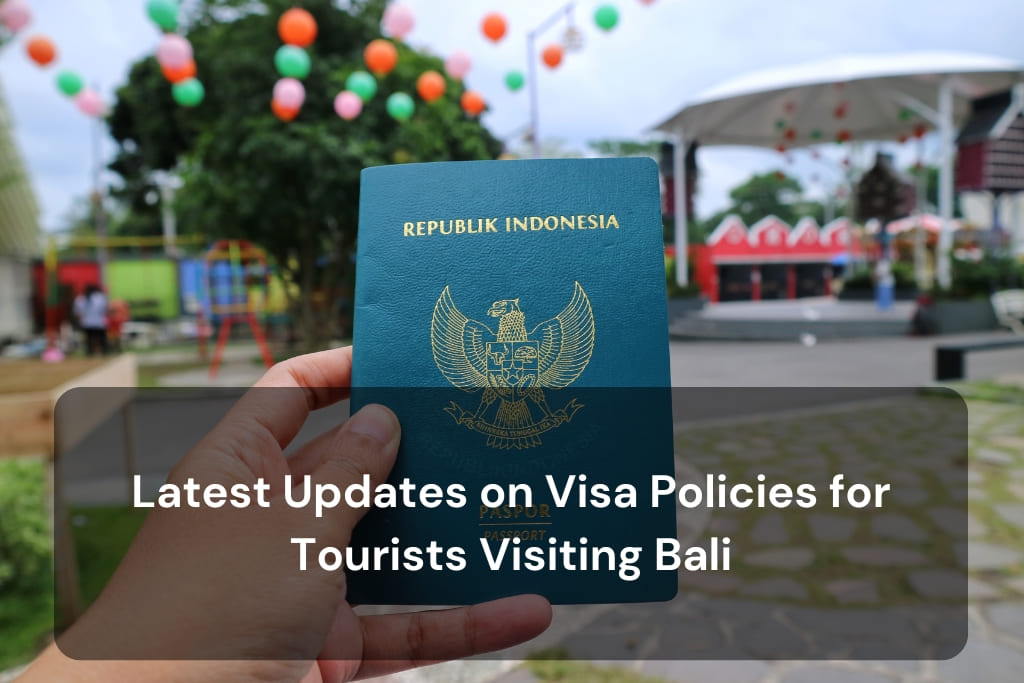
The “Island of the Gods,” Bali, continues to be a popular travel destination worldwide. Known for its stunning landscapes, vibrant culture, and spiritual atmosphere, Bali continues to attract millions of visitors each year. To ensure a smooth and enjoyable experience for these travelers, the Indonesian government frequently updates its visa policies and entry requirements, aiming to streamline the arrival process while supporting sustainable tourism. As Bali looks forward to welcoming an ambitious 6.5 million international tourists in 2025, understanding these latest regulations is crucial for both first-time visitors and seasoned travelers alike. This guide provides a comprehensive overview of the current visa options, key requirements, and essential procedures to help you plan your trip to Bali in 2025. Here’s what you need to know for your trip to Bali based on the latest policies in 2025: Visa Options Navigating the latest visa requirements is essential for a hassle-free start to your adventure. Let’s explore the current visa options available to tourists visiting Bali in 2025, ensuring you’re well-prepared for your journey to the Island of Gods. Key Requirements and Procedures Before you pack your bags and head to paradise, it’s crucial to understand the key requirements and procedures for entering Bali. Ensuring you have all the necessary documentation and are aware of the latest regulations will guarantee a smooth and stress-free arrival. Here’s what you need to know: Simplify Your Bali Visa with Expert Assistance! Navigating the Bali visa process can be complex, but it doesn’t have to be. Visa agencies with skilled specialists can expertly manage your entire visa application process from start to finish. Get personalized help every step of the way, ensuring you have the right information to make informed decisions. Let experienced visa specialists handle the paperwork, so you can concentrate on planning your unforgettable Bali experience. Visit a trusted visa agency E-Visa Bali to begin your application. You can contact us at the following number (+62 877 885 000 99).
Navigating the Process of Securing a KITAS Work Permit for Foreign Workers in Bali
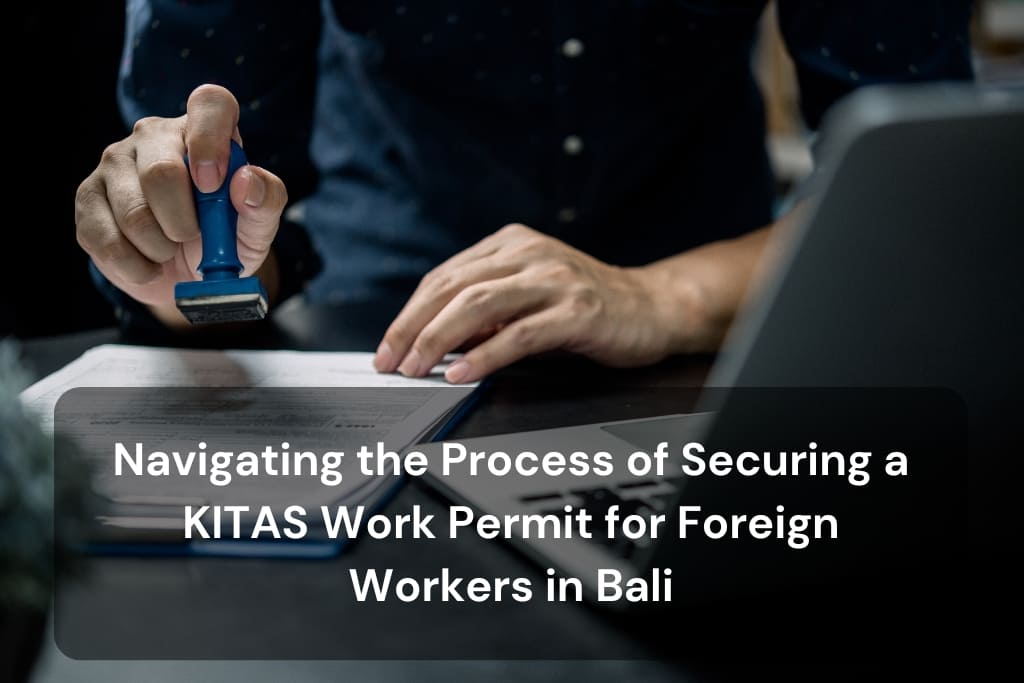
To legally employ foreign workers in Bali, employers must understand and navigate the Indonesian regulations for work permits and stay permits. The key to compliance involves obtaining the necessary documents, including a Work Permit (IMTA) and a Limited Stay Permit (KITAS). Often, the term KITAS is used to refer to the work permit, though it technically refers to the stay permit. Key Documents and Processes Steps to Obtain a Work KITAS The application process for a Working KITAS in Bali involves multiple steps that should begin approximately six weeks before the intended start date of employment: Requirements for Obtaining a Work Visa KITAS a. From the Applicant: b. From the Company-Employer (scanned copies): Important Considerations Safe Alternative Way To work in Bali without issues, it is crucial to follow the proper legal channels. This includes securing the necessary work visa (KITAS) and work permit (IMTA), and complying with Indonesian tax laws by registering with the tax office for a taxpayer number (NPWP). Seeking assistance from legal professionals can further ensure compliance and smooth navigation of the process. You can use e-visa Bali services to make it easier to process a visa. Consult now and enjoy your work in Bali comfortably.

